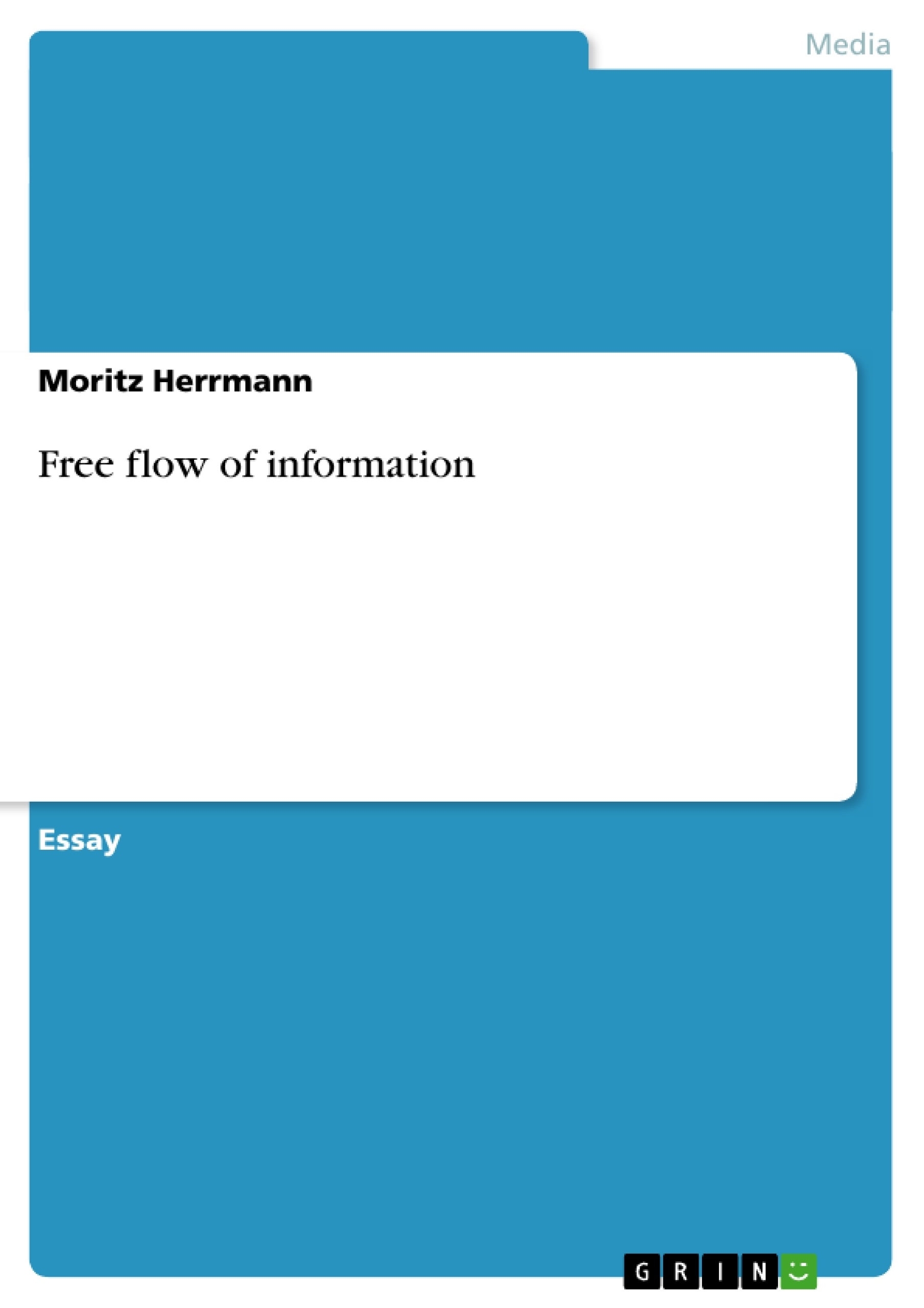Every age has its own dreams and ideals. In our time, the global network society is at the very front of utopias. The joyous spirit of informalism, going hand in hand with free markets, open horizons
and communication without any borders – what a world this would be! Amongst all concepts that could contribute massively to this goal, one stands out: the 'free flow of information'. Supposedly a good thing, it has been controversial ever since, though. Not in terms of general approval that information should be free and accessible for everyone but in the light of different political ideologies. The west understands 'free flow of information' as lack of government controls, while the so-called 'Third World' as well as some states of the former Soviet Union and others stress a 'balanced and unbiased' flow to and from the Third World. In between these opinions, well-known organizations such as UN and UNESCO try to negotiate, helped by non-governmental instances. In order to critique this 'flow of information' more purposefully, I thought of a few questions I'd like to find answers to while examining the whole concept. The questions are: How much is the policy shaped by the rituals of the mass media? Why are politicians so keen and intense about being reporting on in the electronic media, the talk shows, the news? Is there some kind of 'resistance of the political', in a way that the traditional decision-making and
communication patterns happens but is only overshadowed by the excitement of the actual journalism? Do politicians want to be protected from the mass-media spectacle at all – and, if so, how can they, really? Finally, how can the political class force their way of reporting on the journalists and news agencies?
Inhaltsverzeichnis (Table of Contents)
- Critique the 'free flow of information' concept
- The 'free flow of information' concept
- Western communication imperialism
- The 'free flow of information' concept in countries under oppressive rule
- Media theories affected by the concept
- Agenda-setting and campaign journalism
- Embedded journalism
- Culture industry
- Conclusion
Zielsetzung und Themenschwerpunkte (Objectives and Key Themes)
This essay aims to analyze and critique the concept of 'free flow of information' in light of the author's understanding of the media. It examines the concept's historical development, explores various interpretations and debates surrounding it, and assesses its impact on different political ideologies and societal contexts.
- The historical evolution and contemporary understanding of 'freedom of information'
- The role of political ideologies and power dynamics in shaping information flows
- The influence of mass media on political communication and decision-making
- The impact of 'free flow' on countries under oppressive regimes and the potential for positive change
- The implications of media theories such as agenda-setting, embedded journalism, and culture industry on the 'free flow' concept
Zusammenfassung der Kapitel (Chapter Summaries)
- The essay begins by introducing the concept of 'free flow of information' and highlighting its historical development, tracing its origins from the Declaration of Rights in Virginia to the resolutions of the American Society of Newspaper Editors (ASNE) and the Conference of Freedom of Information in 1948.
- The author examines the conflicting perspectives on 'free flow' between the West, Third World nations, and international organizations like the UN and UNESCO. It discusses the contrasting views on government control, balanced information flow, and the potential for 'Western communication imperialism'.
- The text further delves into the impact of the 'free flow of information' concept on countries governed by oppressive regimes. It cites examples like Iran and North Korea, where online platforms and social networks have facilitated dissent and challenged the information monopoly of authoritarian governments.
- The essay explores the influence of media theories such as agenda-setting and campaign journalism, highlighting their potential to both hinder and strengthen the 'free flow' concept. It also analyzes the phenomenon of 'embedded journalism' as a product of restrictive positions on information control, arguing that it can lead to biased and untruthful reporting.
- The author concludes by discussing Theodor W. Adorno's concept of 'culture industry,' which critiques the excessive influence of information and over-stimulation on society, particularly within capitalist contexts. This analysis suggests that while 'free flow' can be a positive force, its unchecked implementation can lead to detrimental consequences.
Schlüsselwörter (Keywords)
The main keywords and focus topics of this essay include: 'free flow of information', 'freedom of speech', 'media control', 'political ideologies', 'Third World', 'Western communication imperialism', 'agenda-setting', 'embedded journalism', 'culture industry', 'information manipulation', 'media ethics', 'censorship', 'digital divide', and 'media literacy'.
- Quote paper
- Moritz Herrmann (Author), 2010, Free flow of information, Munich, GRIN Verlag, https://www.grin.com/document/172823




